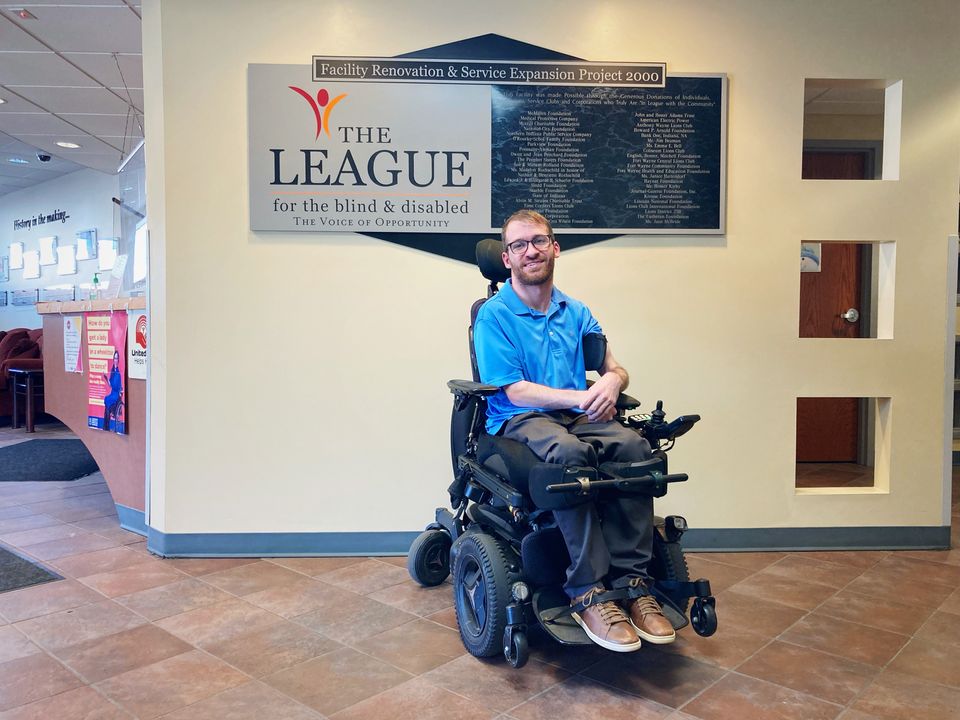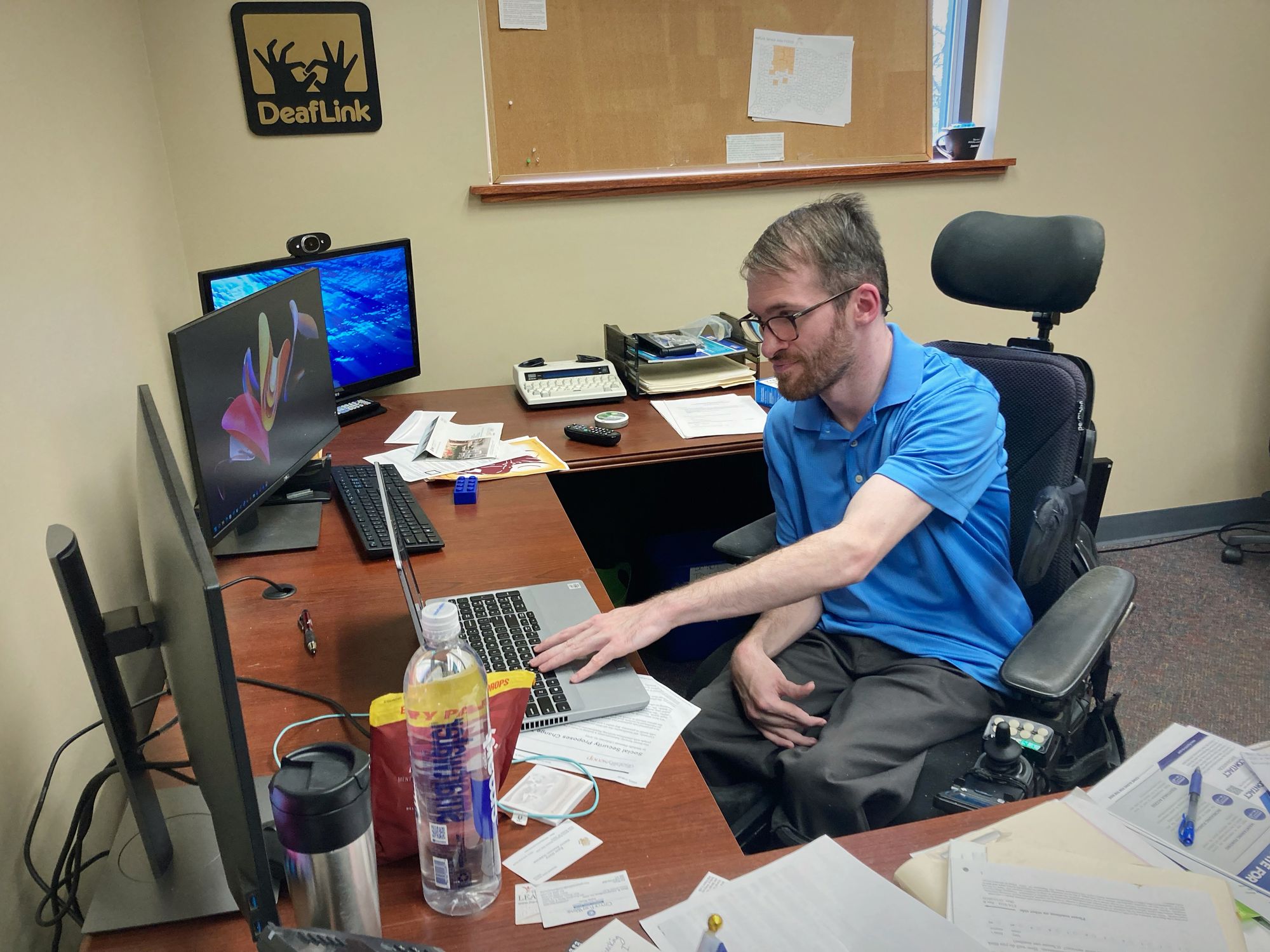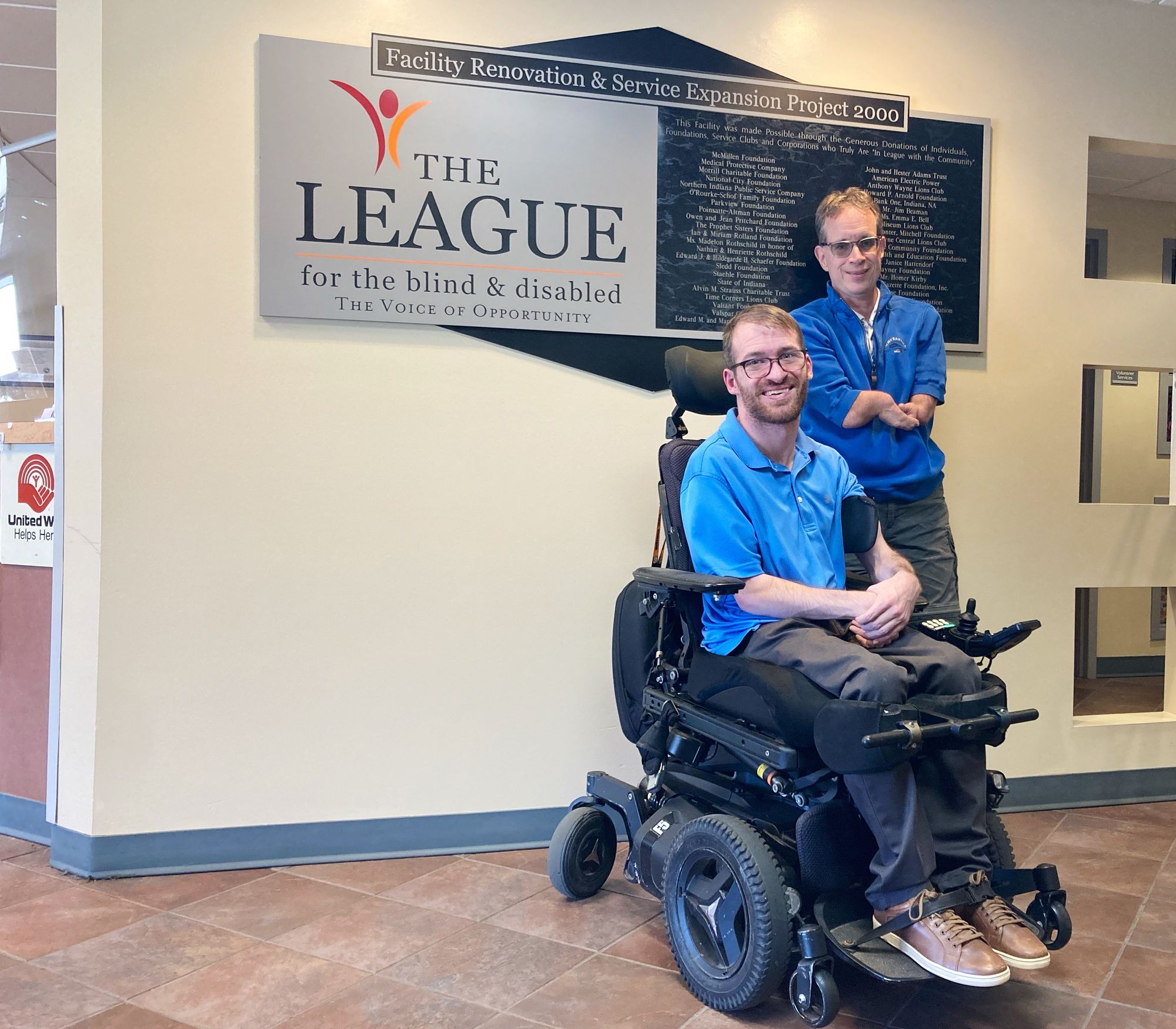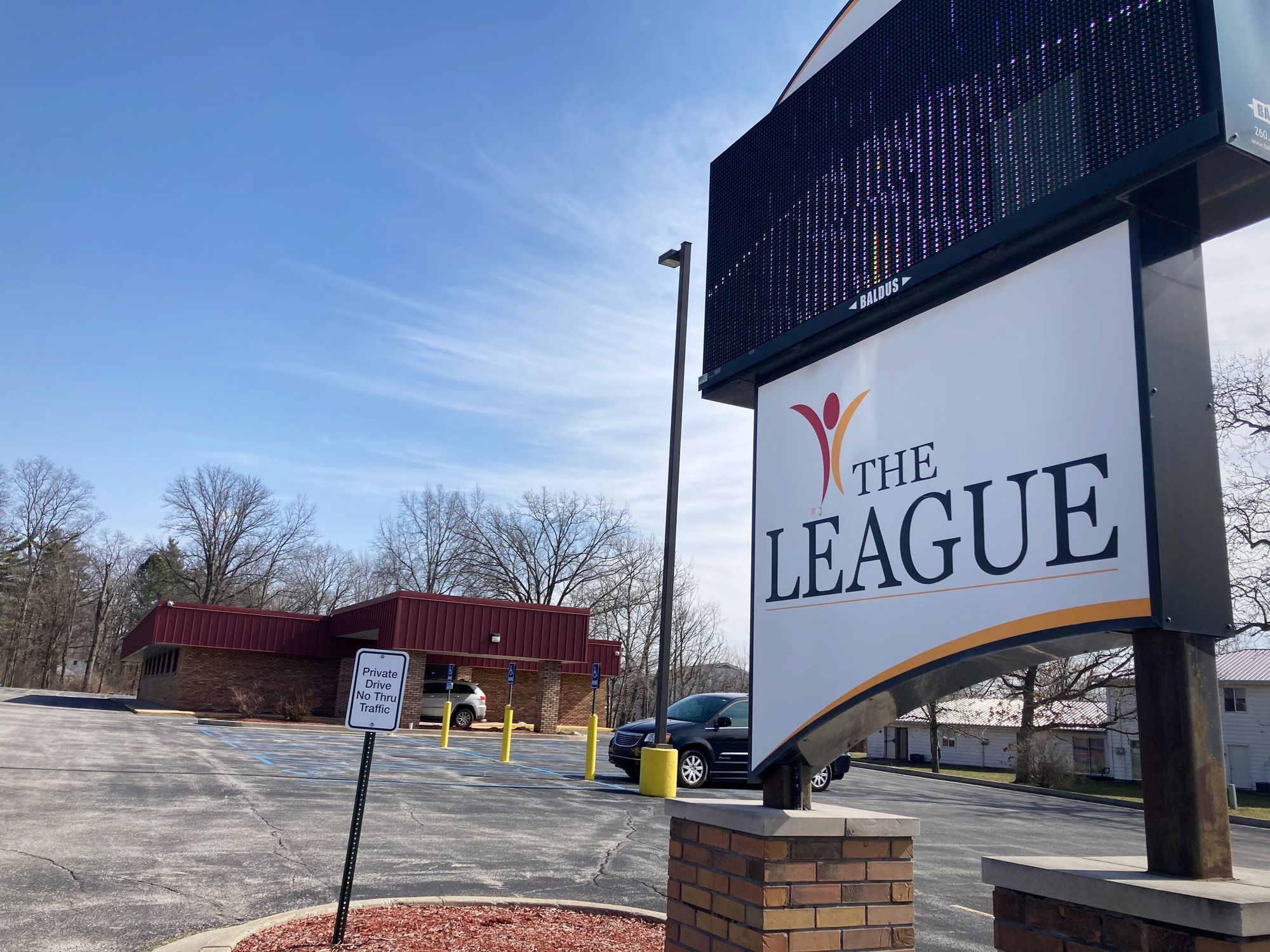Q&A with Luke Labas, addressing systemic challenges to accessibility in Fort Wayne

As a lifelong Fort Wayne resident born with cerebral palsy and using a wheelchair since age four, Luke Labas, now 28, has long had a supportive community around him.
The youngest of five children in his family, his parents, siblings, and teachers helped push and empower him to make his own mistakes, take chances, and grow.
"I was given the opportunity to succeed, to fail and to be put in uncomfortable environments where I learned a lot," Labas says.
But over the years, he's also learned there are many people with disabilities who have not been afforded these same opportunities and nurturing environments to develop the skills that will propel them to reach their full potential.
"Society often tells people with disabilities: There's no hope for you, so you need to find a way to fit in or the road will be long and hard," Labas says.

This conviction is part of what drives him in his work today at the League for the Blind and Disabled, where he helped launch the Inclusion Institute in June 2022 to advocate for accessibility and inclusion in Fort Wayne in new, more systemic ways.
In the past, the League has primarily focused on helping individuals with disabilities face barriers in their daily lives. On the flip side, the Inclusion Institute works from the outside in—advocating for systems and policy change in communities, which leads to a better future for everyone.
"Our ultimate goal is to put ourselves out of a job," Labas says. "We want to create the conditions in Fort Wayne where disability inclusion doesn't need to be advocated for; it's just a part of the norm."
Since March is National Disability Awareness Month, the Institute is hosting three free, public events this month, designed to gather community input and connect residents with local leaders to make change happen.
We sat down with Labas to learn more about his team's work and how the public can get involved.

Tell us more about yourself and what prepared you to launch the Inclusion Institute?
LL: I have cerebral palsy, better known as CP, as a result of being born three months premature. That means, I'm a full-time wheelchair user, and I have personal care assistants throughout the day to help me with my daily living needs (dressing, eating, etc.).
After graduating from Homestead High School in 2013, I went to Ball State University in Muncie because it's the premier school in the country for students with physical disabilities. I studied political science as an undergrad, but as a person with a disability, I realized early on that I would need to get an advanced degree to balance out my lack of internships and employment opportunities.
So I stayed in school and earned my masters in Public Administration with a concentration in Community Education at Ball State in 2018. Soon after graduating, I started working for the League as a case coordinator, one-on-one, with people who have disabilities, helping them with their needs and equipping them with advocacy skills. I learned a lot doing that, and I realized the work we do on a daily basis at the League is not necessarily about me. Some of it does impact me personally, but it's also for the next generation of people living with disabilities of all types—or who might develop a disability someday.
When the pandemic hit in 2020, we had to reevaluate what our positions looked like at the League. I took that opportunity to present my dream role; I wanted to work on systemic advocacy and remove barriers to accessibility.
Then I was presented with an opportunity to help me work toward making that a reality. I applied and got the opportunity to work as the ADA Coordinator and Director of the Office of Disability Services for Mayor Joe Hogsett of Indianapolis.
Tell us more about your experience in Indy, advocating for people with disabilities.
LL: I moved to Indy for the job, and for about a year-and-a-half, I advised the mayor on all things disability policy and programming related.
While I was doing this, a City Council member there asked me once: How many people does your office represent (meaning how many people are considered "disabled")? I responded, "The entire population."
That's because you can acquire a disability one of three ways: 1) You're born with it, 2) you encounter it in a loved one, or 3) if you live long enough, you're going to age into having a disability yourself. You'll become less mobile, or you'll lose your vision or hearing.
People don't often think about disabilities that way. But as a society, we should. We should plan more proactively and make decisions with these considerations in mind. We are all likely to be disabled at some point in our lives, and when that time comes, we will want to access the resources and amenities we need to live well.
In 2022, when I learned that the League received funding to launch an Inclusion Institute, focused on creating system-level change, just like I had always wanted to do, so I came back to Fort Wayne to be part of it.

Tell us more about the Inclusion Institute's work and what it looks like in practice.
LL: The Inclusion Institute is about 10 months old now, and we have three core focus areas we're addressing from a public policy perspective to remove barriers for people with disabilities:
- Systemic Impact: Helping people with disabilities influence laws and policies.
- Community Impact: Helping people with disabilities engage in their communities.
- Individual Impact: Helping people with disabilities become leaders of their own change.
To do this, we have an accessible neighborhoods team, working on expanding accessible, affordable and integrated housing in our community.
We also have an accessible media team, making sure information about services and programs in Fort Wayne is accessible to everyone. Without access to information, you don't have the power to create the change you want to see.
Then we have an economic advancement team, which looks at removing employment access barriers and resource limits. For instance, there are programs for people with disabilities that only allow you to earn up to a certain amount of money, or you risk losing your personal care. As a result, many people with disabilities are left choosing between work and having their personal care needs covered to access life.
There's also a connected community team, focused on infrastructure issues, like sidewalks, curb cuts, and crosswalks in cities. If we don't have access to community connectivity, we can't get the resources we need or access recreation and entertainment. This group meets quarterly with the City's Department of Public Works to talk about infrastructure needs.
For an event we're hosting on March 16, we are opening up that conversation with Public Works for a community input session. This will help us set priorities on what changes need to be made in order to make city infrastructure more accessible.
Tell us more about the events the Inclusion Institute is hosting in March.
LL: On March 9, we're hosting a meeting to talk about trail accessibility with Fort Wayne Trails and City representatives. Before I left Fort Wayne to work in Indianapolis, Fort Wayne Trails asked me to help guide their board from an accessibility point of view. I felt very inadequate because I come from a physical disability point of view, not a sensory-based disability. But I did help, and I stayed on with them virtually during the year-and-a-half that I was in Indianapolis.
A lot of what we're doing with Trails now is working to make information and education more accessible. We have found that, in many cases, people are using the trail, and they don't realize it, or they don't know how to connect to it or where to go. There's also a misnomer that Fort Wayne Trails controls funding for trails or builds the trails themselves. They're actually a nonprofit advocacy commission, and the trails are funded and built through the City's Greenways and Trails Department. The City will also be present at our event on March 9, which is from 2:30-4 p.m. at the AWS Foundation (with a virtual option).
On March 16, we're hosting a second event with a similar format and public input intent, but we're partnering with the City's Department of Public Works and focusing on city infrastructure, as I mentioned. This will be from 2-4 p.m. at AWS (with a virtual option). (Register here.)
Then on March 22, we're hosting an Accessible Housing Symposium called ADA Amplified with Indiana University Fort Wayne in the International Ballroom at the PFW/IUFW campus from 10 a.m.-2 p.m. It will feature a panel of speakers, including home builders and policy makers, and it will offer public input on all types of accessible housing concerns and what it takes for people to live and age independently in their communities. Learn more, and register here.
There's a goal in Indiana to transition about 7% of people currently living in caregiving centers, like nursing homes, into independent, community-based housing. That's a lofty goal because we don't have the housing stock to support accessible living on that scale yet, so where are they going to go? And even if you find a place, if you don't have the necessary community resources, like access to homecare staff, you end up back in the nursing home, so it's a vicious cycle.
There's been a push by the City Council in Fort Wayne to address some of the affordability barriers in housing; why can't we tackle accessibility and affordability at the same time? The disabled population within our city is an ever-growing number. People are aging into it every single day, and people should have the opportunity to age in place, if they choose.
All of these events will be free and open to the public, but they are geared toward people with disabilities and advocates who want to see greater accessibility in the city. We also will allow walkins, but RSVPs are encouraged.
What are some of the challenges you're encountering in this work?
LL: One of the challenges of advocating for people with disabilities is, diversity and inclusion is often viewed as a check box or a token, and someone like me is brought into a room to speak on behalf of all people with disabilities. But I'm not qualified to speak on behalf of all people with disabilities because I'm only one person with one type of disability. I don't know what it's like to be blind or hard of hearing. In doing this work, I often get labeled the disability/accessibility expert, and I really only come at it from one perspective. That's why it's important to us to do public input meetings, like the ones we're hosting in March. We want to bring more people with disabilities and advocates to the table to talk about these issues and see what can be done from a policy perspective.
What are some of the opportunities you see for people with disabilities in Fort Wayne?
LL: Community resources, like, The League, Turnstone, are amazing here, and the work they're doing to spotlight accessibility in Fort Wayne is great. People are actually moving from other parts of the country to Fort Wayne because of its accessibility and resources.
Overall, Fort Wayne is a very philanthropic community, and I think the way it supports people with disabilities is changing and becoming more mainstream. There was a time when people with disabilities were objects of pity or charity. But now, there's a lot of people saying: I'm going to invest in people with disabilities because I believe they have potential and can be an asset to our community and our businesses. I'm feeling that attitude shift.
Three free, public events for Disability Awareness Month in March:
- Accessible Trails with Fort Wayne Trails, March 9, 2:30-4 p.m. at AWS Foundation (with virtual option). Register here.
- Accessible Infrastructure with the City of Fort Wayne Public Works, March 16, 2-4 p.m. at AWS Foundation (with virtual option). Register here.
- Accessible Housing Symposium, featuring a panel of local housing experts, builders and policy makers, March 22, 10 a.m.-2 p.m. at the International Ballroom at IUFW/Purdue University Fort Wayne (in-person only). Register here.
*All events are free and open to walk-ins, but registration is encouraged.
